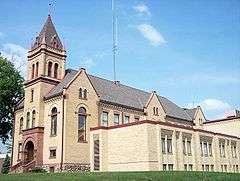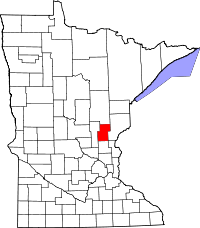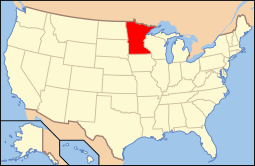Kanabec County, Minnesota
| Kanabec County, Minnesota | |
|---|---|
 The Kanabec County Courthouse in Mora in 2007 | |
 Location in the U.S. state of Minnesota | |
 Minnesota's location in the U.S. | |
| Founded |
March 13, 1858 (created) 1882 (organized)[1] |
| Named for | The Ojibwe word for "snake," after the Snake River |
| Seat | Mora |
| Largest city | Mora |
| Area | |
| • Total | 534 sq mi (1,383 km2) |
| • Land | 522 sq mi (1,352 km2) |
| • Water | 12 sq mi (31 km2), 2.3% |
| Population (est.) | |
| • (2015) | 15,837 |
| • Density | 31/sq mi (12/km²) |
| Congressional district | 8th |
| Time zone | Central: UTC-6/-5 |
| Website |
www |
Kanabec County (/kəˈneɪbᵻk/ kə-NAY-bək) is a county located in the U.S. state of Minnesota. As of the 2010 census, the population was 16,239.[2] Its county seat is Mora,[3] although the original county seat was Brunswick. The county was founded on March 13, 1858 from Pine County and organized in 1882.[4] It is named after the Ojibwe Ginebig, meaning "Snake," after the Snake River — Kanabecosippi (Ginebigo-ziibi in the modern spelling) — which flows through this county.[5]
Geography
According to the U.S. Census Bureau, the county has a total area of 534 square miles (1,380 km2), of which 522 square miles (1,350 km2) is land and 12 square miles (31 km2) (2.3%) is water.[6]
Major highways
 Minnesota State Highway 23
Minnesota State Highway 23 Minnesota State Highway 27
Minnesota State Highway 27 Minnesota State Highway 47
Minnesota State Highway 47 Minnesota State Highway 65
Minnesota State Highway 65 Minnesota State Highway 70
Minnesota State Highway 70 Minnesota State Highway 107
Minnesota State Highway 107- List of county roads
Adjacent counties
- Aitkin County (north)
- Pine County (east)
- Chisago County (southeast)
- Isanti County (south)
- Mille Lacs County (west)
Demographics
| Historical population | |||
|---|---|---|---|
| Census | Pop. | %± | |
| 1860 | 30 | — | |
| 1870 | 93 | 210.0% | |
| 1880 | 505 | 443.0% | |
| 1890 | 1,579 | 212.7% | |
| 1900 | 4,614 | 192.2% | |
| 1910 | 6,461 | 40.0% | |
| 1920 | 9,086 | 40.6% | |
| 1930 | 8,558 | −5.8% | |
| 1940 | 9,651 | 12.8% | |
| 1950 | 9,192 | −4.8% | |
| 1960 | 9,007 | −2.0% | |
| 1970 | 9,775 | 8.5% | |
| 1980 | 12,161 | 24.4% | |
| 1990 | 12,802 | 5.3% | |
| 2000 | 14,996 | 17.1% | |
| 2010 | 16,239 | 8.3% | |
| Est. 2015 | 15,837 | [7] | −2.5% |
| U.S. Decennial Census[8] 1790-1960[9] 1900-1990[10] 1990-2000[11] 2010-2015[2] | |||

As of the census of 2010,[12] there were 16,239 people and 6,277 households in the county. The population density was 31.1 people per square mile (11/km²). There were 7,808 housing units (2014 estimate). The racial makeup of the county was 96.6% White, 0.6% Black or African American, 0.8% Native American or Alaska Native, 0.4% Asian, <0.1% Pacific Islander or Native Hawaiian, and 1.6% from other races or two or more races. 1.7% of the population were Hispanic or Latino of any race. As of the 2000 census, 30.2% were of German, 18.1% Swedish, 13.1% Norwegian, 5.5% American and 5.4% Irish ancestry.
In the census of 2000, there were 5,759 households out of which 34.10% had children under the age of 18 living with them, 58.80% were married couples living together, 8.40% had a female householder with no husband present, and 28.00% were non-families. 23.80% of all households were made up of individuals and 10.30% had someone living alone who was 65 years of age or older. The average household size was 2.58 and the average family size was 3.03.
In the county the population was spread out with 24.0% under the age of 18 and 16.4% who were 65 years of age or older. For every 100 females there were 101.2 males.
The median income for a household in the county was $47,068. The per capita income for the county was $22,291. About 14.2% of the population were below the poverty line.
Communities
Cities
Townships
Unincorporated communities
See also
References
- ↑ "Minnesota Place Names". Minnesota Historical Society. Retrieved March 18, 2014.
- 1 2 "State & County QuickFacts". United States Census Bureau. Retrieved September 1, 2013.
- ↑ "Find a County". National Association of Counties. Retrieved 2011-06-07.
- ↑ Minnesota State Government Series - State Counties
- ↑ Gannett, Henry (1905). The Origin of Certain Place Names in the United States. Govt. Print. Off. p. 172.
- ↑ "2010 Census Gazetteer Files". United States Census Bureau. August 22, 2012. Retrieved October 18, 2014.
- ↑ "County Totals Dataset: Population, Population Change and Estimated Components of Population Change: April 1, 2010 to July 1, 2015". Retrieved July 2, 2016.
- ↑ "U.S. Decennial Census". United States Census Bureau. Retrieved October 18, 2014.
- ↑ "Historical Census Browser". University of Virginia Library. Retrieved October 18, 2014.
- ↑ "Population of Counties by Decennial Census: 1900 to 1990". United States Census Bureau. Retrieved October 18, 2014.
- ↑ "Census 2000 PHC-T-4. Ranking Tables for Counties: 1990 and 2000" (PDF). United States Census Bureau. Retrieved October 18, 2014.
- ↑ "State & County QuickFacts". United States Census Bureau. Retrieved 2015-11-12.
Further reading
- Ziegler, Frank and Robert H Beck (1981). Ken-ā-big : the story of Kanabec County: an illustrated history of Kanabec County, its early years. Mora, MN: B & W Printers. ISBN 978-1-199-49133-6. ISBN 1-199-49133-0.
External links
 |
Aitkin County |  | ||
| Mille Lacs County | |
Pine County | ||
| ||||
| | ||||
| Isanti County | Chisago County |
Coordinates: 45°57′N 93°18′W / 45.95°N 93.30°W